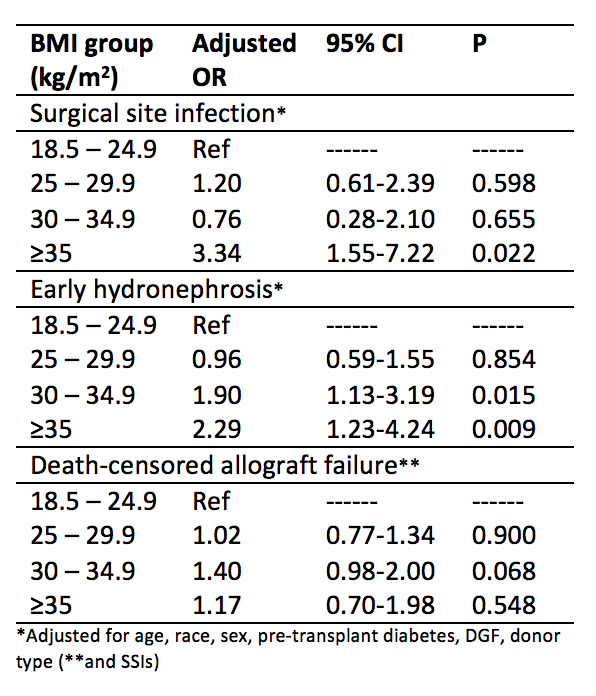Association of Obesity and Early Post Kidney Transplantation Complications
Columbia University Irving Medical Center, New York, NY
Meeting: 2021 American Transplant Congress
Abstract number: 1277
Keywords: Kidney, Kidney transplantation, Obesity, Surgical complications
Topic: Clinical Science » Organ Inclusive » Non-Organ Specific: Disparities to Outcome and Access to Healthcare
Session Information
Session Name: Non-Organ Specific: Disparities to Outcome and Access to Healthcare
Session Type: Poster Abstract
Session Date & Time: None. Available on demand.
Location: Virtual
*Purpose: Although the prevalence of obesity among kidney transplant recipients is rising, there continues to be reluctance to waitlist obese candidates. We sought to determine the association between recipient body mass index (BMI) and early post-transplant complications.
*Methods: Single-center, retrospective cohort study of all adult kidney transplant recipients from 2004-2020. Recipients were stratified into four BMI (at transplant) categories: normal-weight (BMI 18.5-24.9kg/m2, n=1020), overweight (BMI 25-29.9, n=1002), moderately obese (BMI 30-34.9, n=510), and severely-to-morbidly obese (BMI ≥35, n=274). Logistic regression was used to estimate the association between BMI category and surgical-site infections (SSIs), hydronephrosis, and allograft survival.
*Results: Recipients with BMI≥35 had significantly higher rates of SSIs (p<0.001) and hydronephrosis (p<0.001) compared with recipients in all other BMI categories. On multivariable analysis, recipients with BMI≥35 had increased odds of SSIs compared with normal-weight recipients (odds ratio [OR], 3.3, 95% CI 1.6-7.2, p=0.022), and recipients with BMI 30-34.9 and ≥35 had increased odds of early hydronephrosis (OR 1.9, 95% CI 1.1-3.2, p=0.015, and OR 2.3, 95% CI 1.2-4.2, p=0.009, respectively). While no BMI groups experienced increased odds of allograft failure, recipients who were Black, diabetic pre-transplant, and experienced delayed graft function were at increased odds on multivariable analysis. When the highest BMI group was further stratified into 39.9 and ≥40 kg/m2 on sensitivity analysis, both groups remained significantly associated with an increased odds of surgical site infections (OR 3.2, 95% CI 1.4-7.3, p=0.047, and OR 3.7, 95% CI 1.3-10.6, p=0.014) compared to the normal weight group.
*Conclusions: Obesity is associated with an increased risk of immediate post-transplant complications such as SSIs and hydronephrosis, but is not associated increased long term risk of kidney allograft failure.
To cite this abstract in AMA style:
Sandra V, Sanichar N, Tsapepas D, King KL, Bever JVan, Toma K, Hussain A, Mohan S. Association of Obesity and Early Post Kidney Transplantation Complications [abstract]. Am J Transplant. 2021; 21 (suppl 3). https://atcmeetingabstracts.com/abstract/association-of-obesity-and-early-post-kidney-transplantation-complications/. Accessed February 17, 2026.« Back to 2021 American Transplant Congress

